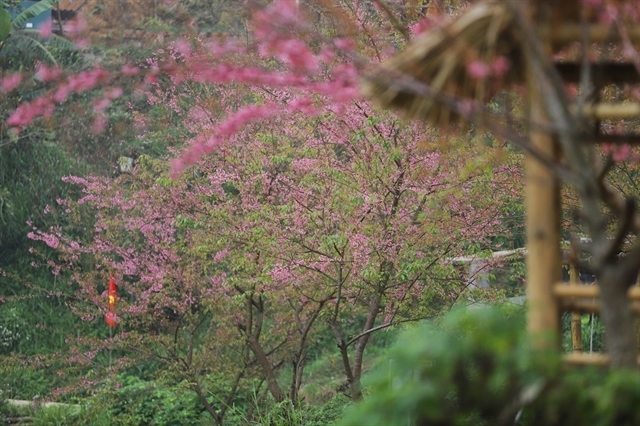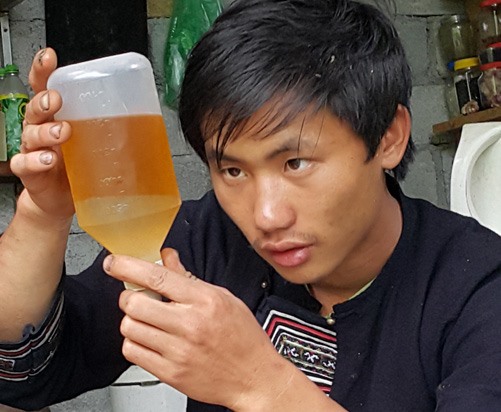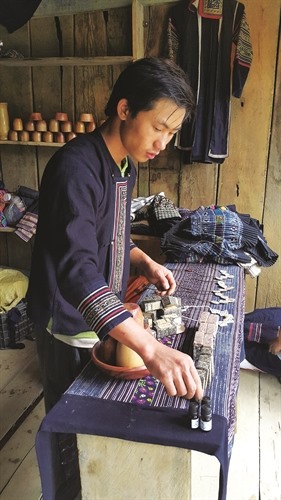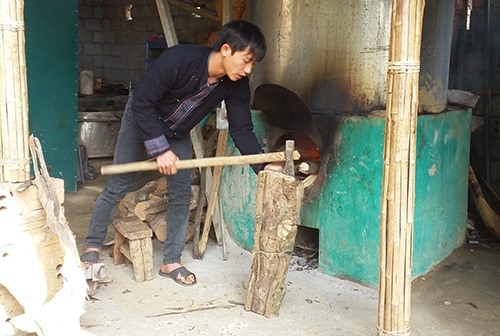 Features
Features

Sheltering under a canopy of wild trees in Sa Pa Town, in the northern province of Lào Cai, Má A Nủ holds a reaping hook, used to collect herbs which are the source of various kinds of essential oils.
 |
| An eye for oil: Nủ is 23 and a member of the Mông ethnic group. He is also owner of H’mông Cát Cát, the largest co-operative producing essential oils in Sa Pa Town. |
By Minh Thu
Sheltering under a canopy of wild trees in Sa Pa Town, in the northern province of Lào Cai, Má A Nủ holds a hook knife, used to collect herbs which are the source of various kinds of essential oils.
Nủ, 23, an ethnic Mông man, is the owner of Mông Cát Cát, the largest co-operative producing essential oils in Sa Pa. He has managed to generate a good income for himself, and has created jobs for many Mông people.
Nủ’s father passed away when he was in secondary school. A life of poverty forced him to give up studying and begin farming work to support his mother.
His life changed after a visit to a friend in Bản Khoang Commune, Sa Pa District, where a number of households had joined a project growing and distilling essential oil herbs. Unfortunately many households failed to earn a decent living from the project, and soon returned to rice and maize farming.
But Nủ himself found he had a strong interest in producing essential oils. He tried hard to learning the techniques from the project and returned to home town to develop the process for himself.
“The more I learned, the more passionate I became,” said Nủ.
“I spent a year and a half learning the techniques from other people, then I went to nearby forests to research local trees.”
 |
| Open for business: Má A Nủ presents his products at his shop in Cát Cát Village. — Photo vov.vn |
Sa Pa Town is located in a mountainous region with an abundance of forests, home to many valuable plants and herbs that can produce essential oils.
Nủ said he wanted to introduce people to the specialities of his hometown, specially oils extracted from wild plants and herbs in service of health care.
The Cát Cát Co-operative was established in 2015 to produce natural essential oils, herbal soaps and salt from local materials.
“The products are traditional herbal medicines of the Mông in Sa Pa, made from hundreds of herbs in the forest,” said Nủ. “This is not only about commercial bussiness, but also about preserving the valuable medicinal knowledge of the Mông, and introducing to people around the country.”
“I hope that I can earn money from the available local resources, producing high quality products which meet market requirements.”
His mother, Vàng Thị Tòng, 53, was nervous when Nủ told her he wanted to produce essential oils.
“I didn’t think that he would be successful because we Mông people often use herbs to take a bath and cure our wounds at home. How can Nủ think of selling oils extracted from those plants?” said Tòng.
“I was sure he wouldn’t be able to sell his products, but he explained to me that he studied the techniques carefully and he wanted to try a new bussiness. It may help us escape from poverty. I sold our only buffalo, the family’s most valuable asset, in order to support him financially.”
 |
| Hard work pays off: Nủ represents the younger generation of Mông people, with a strong will and progressive attitude to improve their livelihoods. |
Nủ would lose himself on his hunts for herbs and plants in the forest. He would often return with a backpack full of herbs and an empty stomach.
“I began with a 100-litre capacity autoclave,” said Nủ. After one day, exhausted and ecstatic, he extracted his first drops of essential oil.
However, after an initial period, he soon realized he would have to invest in large-scale production.
Nủ began his journey with knowledge, experience, self-confidence and hope, but faced a number of obstacles.
Struggles in getting other people involved, a lack of money to buy machinery, and trouble preserving the materials and finished products were difficult challenges to overcome. The pressure of selling products was constantly on the young man.
Relying on entrepreneurial spirit, Nủ sold his products to tourists in town and at local resorts and spa parlours, and took advantage of social networks to advertise and distribute the essential oils.
Now his products are available not only in Sa Pa but also Hà Nội, HCM City and Bình Dương Province.
“I now have contracts to provide aromatic herbal products to 10 resorts and spa parlours. I have been able to get more people involved in working for my co-operative. They have a stable job and salary,” Nủ.
His speciality products include essential oils of Ocimum gratissimum, mint, lemon grass, cinnamon, orange, and ginger; as well as herbal bath salt and herbal soaps.
“These products have antibacterial properties, help ease muscle soreness, and thicken and promote hair growth,” said Nủ.
“They can be used as fragrances in the home, for facial cleansing, hair care, and nourishing the skin.”
Due to a large demand for materials, Nủ has enlisted local people to grow herbs and supply raw materials for him. Now he has 12 households involved in production. Instead of picking wild herbs in the forests, he has a stable source of raw materials and the growers get stable incomes in return.
Vàng A Căn, 22, a member of the Cát Cát Co-operative, said Nủ’s had eased the life of many local people.
“We never thought the wild mountain plants and herbs could be used to earn a better living,” said Căn. “Nủ represents the younger generation of Mông people, with a strong will and progressive attitude to improve their livelihoods.” VNS




